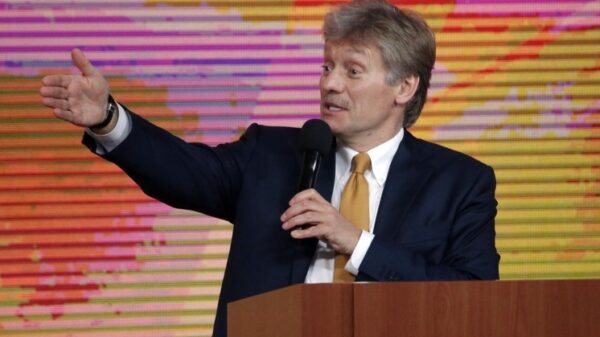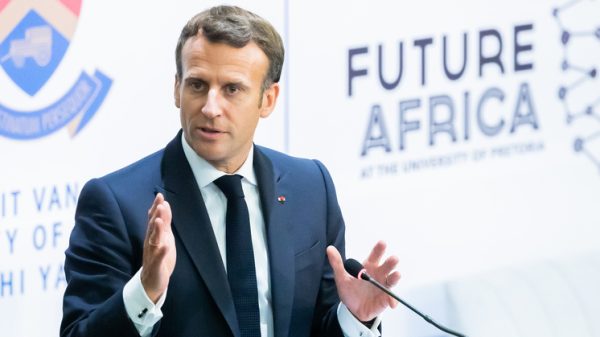 Primoz Roglic and Jonas Vingegaard stand alongside Sepp Kuss as he cruises to victory in the 2023 Vuelta a España. Photo: Tim de Waele/Getty Images < p>It was a touching scene that seemed like it might not always play out. Jonas Wingegaard, Sepp Kuss and Primoz Roglic riding hand in hand to Madrid on Sunday evening at the finish of an extraordinary Vuelta a España; Vingegaard, the reigning Tour de France champion, and Roglic, the reigning Giro d'Italia champion, grin and point to Kuss between them, wearing the red Vuelta leader's jersey, as if to say: «Sepp is the man.»
Primoz Roglic and Jonas Vingegaard stand alongside Sepp Kuss as he cruises to victory in the 2023 Vuelta a España. Photo: Tim de Waele/Getty Images < p>It was a touching scene that seemed like it might not always play out. Jonas Wingegaard, Sepp Kuss and Primoz Roglic riding hand in hand to Madrid on Sunday evening at the finish of an extraordinary Vuelta a España; Vingegaard, the reigning Tour de France champion, and Roglic, the reigning Giro d'Italia champion, grin and point to Kuss between them, wearing the red Vuelta leader's jersey, as if to say: «Sepp is the man.»
The American, for whom it was his first Grand Tour victory after years of faithful homework, looked both humbled and encouraged by the respect shown to him by his two more distinguished teammates.
>The display of team unity capped a remarkable season for Jumbo-Visma, who scored two historic trebles in Spain; a clean Vuelta podium (the first team to do so since Cas in the 1966 Vuelta) and a Grand Slam Grand Tour in one calendar year (the Dutch superteam are the first team to ever do so — even Team Sky in their most dominant years never ended in victory).
It also capped a remarkable three weeks from which Jumbo emerged almost untouched. And their reputation has increased significantly.
 Vingegaard, Kuss and Roglic take the podium in Spain just as their team won the Grand Tours this season. Photo: Tim de Waele/Getty Images How they did it
Vingegaard, Kuss and Roglic take the podium in Spain just as their team won the Grand Tours this season. Photo: Tim de Waele/Getty Images How they did it
Make no mistake, things could have gone very differently for the Dutch team in the last few days of the race. For a while last week it looked like Jumbo might finally inherit Team Sky's mantle as the most successful but least loved team in cycling.
After Roglic rode away from Kuss to Angliru at the end of stage 17, and Vingegaard followed the Slovenian, Jumbo's reputation was very much at stake. Kuss's once healthy lead in the general classification was gradually eroded by his two teammates, who were now ranked second and third overall, and fans of all denominations were apoplexy at the thought that one of them might take the jersey away from him at the moment of his glory.
It's not common practice in cycling to attack your teammates, especially if they've sacrificed themselves for years for your Grand Tour success. Kuss may not have arrived in Spain as the designated Jambo leader, having inherited the jersey at the start of the race almost by accident, but now that he was wearing it, the soft-spoken 29-year-old from Colorado was very determined to win. unless one of his teammates took it away from him.
That they didn't was due to a combination of factors, not least a small but decisive turn by winning Bahrain rider Mikel Landa, which helped limit Kuss's losses at Angliru, meaning the American was still in the lead by eight seconds from Vingegaard at the end of last Wednesday.
❤️ Leader from stage 8° to the final. Nadi left the bank with Sepp Kuss. ¡Disfruta del Minuto de La Roja!
❤️ From the 8th stage to Madrid, no one managed to overtake Sepp Kuss! Enjoy the last minute of the red jersey game!
#LaVuelta23 @CarrefourES #CarrefourConLaVuelta pic.twitter.com/mmBSnXAHeP
— La Vuelta (@lavuelta) September 17, 2023
But perhaps most important was public opinion. By Wednesday evening it was clear that if Jumbo continued to allow its three drivers to fight as they had threatened, there would be an outcry and the team would lose a lot of goodwill.
They chose the smart option and earned a lot of PR credits in the process. «We found ourselves in a great situation [with the top three riders on the GC], but at the same time one that has never been seen before and for which there was no textbook solution,» Jumbo-Visma managing director Richard Plugge said on Sunday. explaining your thinking. “We had good discussions with all parties involved. We listened to everyone's opinion, discussed everything, based on this we made a plan and asked if everyone was happy with it. As a team, we have been true to our values and racing philosophy – winning together.”
Plagg added: “Picking one winner is like choosing between your own children. We just wanted to win the Vuelta. It didn't matter with whom. It's remarkable that two great men, based on their personal leadership, allowed [Kuss] to do this.»
How did they do it?
Jumbo-Visma now reigns supreme on the grand tours. This has been obvious for a long time, but the current dominance is on a scale that was previously unimaginable. This begs the question: how could a team with the biggest budget in cycling (exact numbers are difficult to pin down, but it is believed that Jumbo has perhaps the third largest budget in the World Tour, significantly less than teams such as Ineos Grenadiers and Soudal-QuickStep . ) managed to establish themselves as such a force?
Plagge, a former journalist, said on Sunday it was the culmination of 10 years of brutal graft, which he divides into three eras. The first era was simply about surviving the Rabobank years. The second event after the advent of Lotto-Jumbo was consolidation. It was an era when Sky dominated and Plugg says he and sporting director Merijn Zeeman tried too hard to emulate their «marginal benefit» philosophy. “We paid too much attention to detail,” he said. “But they are only effective if the foundation is good. We realized that we needed to train, sleep and eat properly—the fundamentals of being an athlete—as well as [getting to grips with] the equipment. Therefore, we have discarded all the details of marginal profit. Everyone tried to copy Sky. But it all starts with five hours of training a day.”
 Richard Plugge joins three of his Grand Tour winners on the podium in Madrid . Photo: Tim de Waele/Getty Images
Richard Plugge joins three of his Grand Tour winners on the podium in Madrid . Photo: Tim de Waele/Getty Images
The team began to have some success with Dylan Groenewegen, and then Roglic joined them. He may not have won the Tour de France (yet), but on Sunday Plugge called the Slovenian the «king of the team.»
The third stage was all about excellence. Plugge talks about building culture, Zeeman taking inspiration from famed Chicago Bulls head coach Phil Jackson, and talking with Dutch special forces to figure out how to push athletes without pushing them to the edge.
Only then, with the help of everything in the game, was it time to unleash what he used to call the «total cycle», a game with the theme of total football, first conceived during the Johan Cruyff era of Dutch football in the 1970s.
“It could sound like arrogance,” Plugge admitted in an interview with the Cycling Podcast last December. «But when you saw the stage of the Col du Granon [the 2022 Tour de France, when Jumbo worked on Tadej Pogacar and effectively ended last year's Tour for Vingegaard], you really understood what I meant.»
May we them trust? ?
Naturally, there will be those who watch Jumbo's performances this year — we haven't even talked about the wonderful Wout van Aert — and think: we've already heard that. How can we trust Jumbo when history has shown that incredible results on a bike often turn out to be literally that?
Ultimately, there is no way to know. Skepticism is the standard (and only sensible) parameter in cycling, and naturally the Jumbo riders and staff were asked how we could trust them. Undoubtedly, the Dutch team was helped in this case by the fact that it was Kuss who won, and not their strongest GC rider. The American is extremely popular and considered very trustworthy. Kuss said that for him, «cheating or doping is out of the question» because he doesn't need to win to feel good. He added that accepting that «sometimes you're not good enough» is a fundamental part of the sport.
How long can they keep this up?
While this doping question will certainly continue to be asked as long as Jumbo maintains this level, it remains unclear how long that will continue. Just because the Jumbos managed to avoid a full-blown civil war last weekend doesn't mean there weren't tensions within the team. Will the team be able to satisfy all of its riders? Will Kuss want to lead other Grand Tours now that he has proven he can win one?
There are already rumors that Roglic may be looking to move to a team that can guarantee him a lead at the Tour de France.
Naturally, Plugg played this down when asked about it on Sunday. “Roglic is our king, and it’s hard to let go of a king,” he said. “He’s won every GC race he’s started this year except this one, and he’s won 15 races this year. Why did I decide to let him go?
“If you compare it to football, he is the goalscorer who scores the most goals for our team along with Jonas [Wingegaard]. If he leaves, we will concede a lot of goals and we will have to look for someone who will score more goals, and there are not many people who can do that.”
Time will tell. One thing Team Sky did very well during its glory years was transition from one big beast to another, even if some of those continuities were bloody.
Plagge stressed that other teams will not sit idly by. Tadej Pogačar, a generational talent, will clearly be keen to reclaim the yellow jersey in France next summer. Ineos are lacking direction at the moment, but their vast wealth suggests they will return at some point, be it with Carlos Rodriguez as GM or someone else. Perhaps after the Olympics Tom Pidcock will go all in on the Grand Tours. Can Remco Evenepoel win a Grand Tour that will also see Pogacar, Vingegaard and Roglic finish? A decision on this issue has not yet been made.
“We must remain vigilant,” concluded Plugge. “Merein Zeeman and I are assessing what we can learn from this Vuelta to be even more successful next year. We owe it to ourselves to look in the mirror, because before you know it, you'll be overtaken.
“Our only goal that we didn't achieve this year was winning the Tour of Flanders or Paris-Roubaix. There is still a lot to be done. This is a very nice crown for a decade of hard work, but I'm not going to sit back now. We have drawn up a big plan until 2030. There is room for even more crowns.”

























































Свежие комментарии